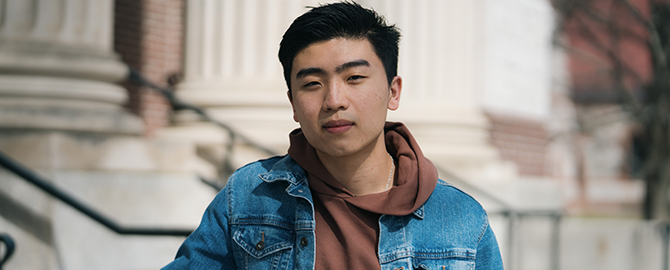
Early opportunities for research prepare the way for greater discovery.
You’d have to thank Nick Sugiarto ’23’s sense of humor for bringing him to Dartmouth. “I am a big Conan O'Brien fan, and I saw his commencement video on YouTube and absolutely fell in love with it,” he laughs. “Not just the speech itself, but the vibe around the speech—that’s what really drew me in.
“Conan was teasing then-President Kim and the whole time Kim was just dying there laughing… I wanted that friendly, open vibe of a school that works hard but doesn’t take itself too seriously.”
Now the editor of the comedy magazine Dartmouth Jack-o-Lantern and a former president and stand-up comic with the Dartmouth Comedy Network, Sugiarto says he’s taking the opportunity to do comedy in a supportive environment like Dartmouth, “where everyone is your friend, and you can walk into a room and not have to worry about whether they already hate you. Obviously, you still want to make them laugh and I work hard toward that.”
Computational biology in cancer research
Hard work characterizes Sugiarto’s academic focus as well. An “Introduction to Programming & Computation” class presented an “a-ha moment” to him when he realized how well it complemented his interest in biology and physics.
“When I came to Dartmouth I wanted to be a doctor, and I applied to research on a whim,” he recalls. “I wanted to explore some computational biology opportunities, and I just fell in love with it.” He has been recognized as a James O. Freedman Presidential Scholar, a Neukom Research Scholar, and, most recently, a Goldwater Scholar. Each of these scholarships has supported some aspect of his research.
Becoming a senior fellow means that next year he will take just three classes and devote the remainder of his academic time to research. “I've been fortunate in that the first time I ever worked in a research lab, I couldn't see myself leaving—and the lab managers don’t want me to leave either, so it works out for both of us.
“When I first came to research, I thought it was one dude at a chalkboard muttering to himself,” he says with a laugh. “But it's much more team based. I work with PhD candidate Luke Deary to study how a family of chromatin remodelers called SWI/SNF function. We know what their function is, but we don't know how they work. Because the human genome is so large, I'm responsible for getting the data and processing it to reach significant statistical conclusions.” Sugiarno credits his advisors, Siming Zhao and Xiaofeng Wang, with spearheading a substantial part of his project.
SWI/SNF mutations are present in about 25 percent of all human cancers, Sugiarto says, so if we can understand how it functions, there could be a drug targeted downstream to potentially treat a quarter of all human cancers.
Financial aid makes it possible
“As a beneficiary of financial aid, I want to thank the donors, because without their gifts there’s no way I could’ve come to an institution like Dartmouth. I’m asking for their trust in a sense because I realize funding undergraduate research isn't as flashy as funding full-on graduate student labs—but it gives people like me who are just starting out the opportunities to dip their toes into it for the first time and get the early development needed that helps them along in science. “During spring term, I was invited to take part as a speaker in the Dartmouth Innovation & Technology Festival. I also attended a dinner for the donors and although I had heard the names of the donors who were funding my research, this was the first time I had talked to them. I was blown away by how kind and welcoming they all were. I want to thank them for being in the Dartmouth community and extending a hand to people like me. I can’t thank them enough for that.”
